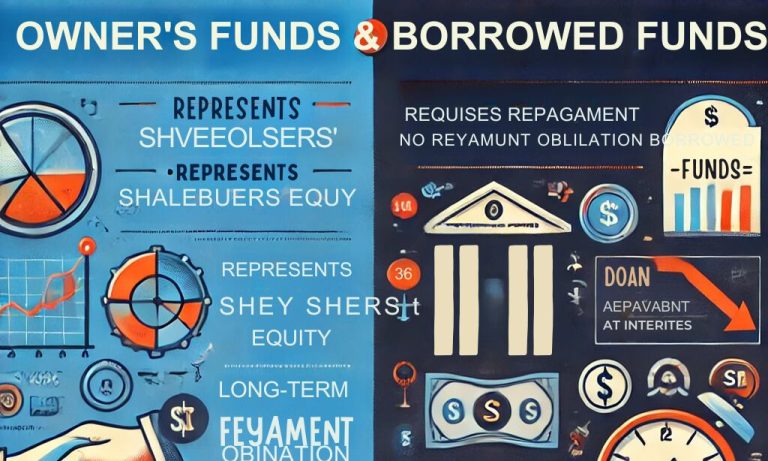The difference between owners funds and borrowed funds lies in their source, ownership implications, and cost. Owners’ funds are derived from business owners, including equity shares, reserves, and retained earnings. Borrowed funds are money owned by an outside source since it comes on account of loans, debentures, or bonds on which the company has to pay interest. Both types of funds are required for a company’s capital structure and financial planning.
What are Owners Funds?
Owners’ funds refer to the money investors inject into the company and retained earnings in the business. Funding of this nature forms the base of a company’s financial system, and financial statements and indicates how much the owners own in the business.
Key Features of Owners Funds
Owners funds represent the core financial foundation of a business, contributed by its owners or shareholders. These funds are vital for long-term investments and provide stability, control, and risk-bearing capacity to the enterprise.
- Permanent Capital: Owners funds remain invested in the business as long as it operates. There is no obligation to repay this capital.
- Risk Bearing: Owners take on the financial risk associated with the business. If the company incurs losses, the value of owners funds may decrease.
- Control and Decision-Making: Owners funds typically provide voting rights and influence in business decisions, especially in companies with equity shares.
- Source of Long-Term Capital: Owner’s funds are used for long-term investments, such as purchasing fixed assets or expanding operations.
Components of Owners Funds
Owners funds comprise various components that reflect the financial contributions and retained wealth of a business. These elements ensure stability and support the company’s growth and expansion initiatives.
- Equity Capital: The capital contributed by shareholders or partners in exchange for ownership.
- Reserves and Surplus: Accumulated profits retained in the business for reinvestment.
- Retained Earnings: Profits reinvested in the company instead of being distributed as dividends.
Importance of Owners Funds
Owners funds are crucial for the financial health of a business, offering stability and flexibility. They enable companies to manage operations and growth without the burden of repayment obligations.
- Stability: Since these funds do not require repayment, they provide financial stability.
- Flexibility: Companies can use owners funds for any business purpose without restrictions.
What is Borrowed Funds?
Borrowed funds are external liabilities obtained from lenders or creditors. These funds must be repaid within a specified timeframe, along with agreed-upon interest, making them a key part of short-term and long-term financing strategies.
Key Features of Borrowed Funds
Borrowed funds are an essential financing option for businesses, offering flexibility to meet both short-term and long-term financial needs. These funds come with repayment obligations and fixed costs but do not impact ownership control.
- Repayment Obligation: Borrowed funds require repayment of the principal amount along with interest, regardless of the company’s profitability.
- Fixed Cost: Borrowed funds incur a fixed cost in the form of interest, which is often tax-deductible.
- No Ownership Dilution: Borrowing does not dilute the ownership or control of the business, unlike issuing equity.
- Short and Long-Term Options: Borrowed funds can be utilized for both short-term needs, like working capital, and long-term projects, like infrastructure.
Sources of Borrowed Funds
Borrowed funds can be sourced from various external channels, providing businesses with the capital needed for operations or expansion. These sources include loans, debt instruments, and trade credit for flexible financing.
- Loans from Financial Institutions: Funds borrowed from banks or NBFCs for specific purposes.
- Debentures and Bonds: Debt instruments issued to the public or institutional investors to raise long-term capital.
- Trade Credit: Short-term credit extended by suppliers.
Importance of Borrowed Funds
Borrowed funds play a vital role in financing business growth by providing additional resources and offering tax advantages. They enable companies to leverage opportunities beyond their internal capacities.
- Leverage: Borrowed funds help businesses expand beyond what their internal resources can support.
- Tax Benefits: Interest payments on borrowed funds are tax-deductible, reducing the cost of capital.
Difference Between Owners Funds & Borrowed Funds
Owners funds and borrowed funds serve distinct purposes in financing a business. Below is a detailed comparison of their differences:
Source of Funds
- Owners Funds: These come from the owners, shareholders, or partners of the business. It represents internal financing generated through equity contributions, reserves, or retained earnings. Example: A company reinvesting its profits into operations is using owners funds.
- Borrowed Funds: These are obtained from external sources such as banks, financial institutions, or the public via debt instruments like bonds or loans. Example: A firm taking a loan from a bank to fund expansion is using borrowed funds.
Obligation of Repayment
- Owners Funds: There is no repayment obligation for owners funds. The capital remains in the business indefinitely unless the company is liquidated.
- Borrowed Funds: Borrowed funds come with a mandatory repayment schedule, including interest payments, which must be honored regardless of profitability.
Cost of Funds
- Owners Funds: The cost of owners funds is not fixed but depends on stakeholder or shareholder expectations, often in the form of dividends or capital appreciation.
- Borrowed Funds: Borrowed funds involve a fixed cost in the form of interest, which is a legal obligation.
Risk Bearing
- Owners Funds: Owners bear the risk of business losses. If the business incurs losses, the value of their investment decreases.
- Borrowed Funds: Lenders do not bear the business risk. Their returns (interest and principal repayment) are fixed and prioritized.
Impact on Ownership & Control
- Owners Funds: Raising owners funds, especially through equity, may dilute the ownership and voting rights of existing shareholders.
- Borrowed Funds: Borrowing does not dilute ownership, as creditors do not have voting rights or control over the business.
| Aspect | Owners Funds | Borrowed Funds |
| Source of Funds | Internal financing from owners, shareholders, or retained earnings. | External sources like loans, bonds, or financial institutions. |
| Obligation of Repayment | No repayment obligation; capital stays indefinitely. | Mandatory repayment schedule with interest, regardless of profitability. |
| Cost of Funds | Variable cost based on dividends or capital appreciation. | Fixed cost in the form of interest payments. |
| Risk Bearing | Owners bear business risks; investment value fluctuates with performance. | Lenders have fixed returns and are shielded from business risks. |
| Impact on Ownership & Control | May dilute ownership and voting rights of existing shareholders. | No dilution of ownership or control, as creditors have no voting rights. |
Conclusion
The difference between owners funds and borrowed funds lies in their source, repayment obligations, and impact on ownership. Owners funds are permanent, risk-bearing, and involve no repayment, making them ideal for long-term stability and growth. Borrowed funds, while cost-effective due to tax benefits, come with fixed repayment obligations and are better suited for short-term needs or leveraging growth. A balanced use of both ensures a company’s financial health and operational efficiency.
Owners Fund vs Borrowed Fund FAQs
What is Owner’s fund?
Owners’ funds consists of the owners’ money; these include equity capital, reserves, and retained earnings.
What are borrowed funds?
Borrowed funds are external liabilities raised through loans, bonds, and trade credit and need to be repaid with an addition of interest.
Which is more riskier-owners funds or borrowed funds?
There is uncertainty about the owners’ funds to the investor because they absorb the losses of the business. Borrowed funds are risky to the business because they need to be repaid.
Why are borrowed funds tax efficient?
Interest paid on borrowed money reduces the cost of borrowing because it is tax deductible.
How do owners’ funds contribute to the control of a business?
Getting the money from owners, especially through selling shares, reduces the ownership and control of current shareholders.


